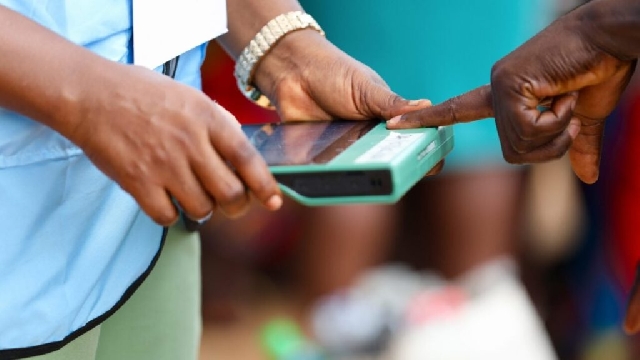EVI proposes comprehensive election validation reforms for Ghana's 2024 elections
 Biometric Verification Device
Biometric Verification Device
The Election Validation Intelligence (EVI), an innovative advocacy group focused on improving election validation processes, has unveiled a proposal aimed at addressing significant gaps in Ghana’s current election validation system.
This initiative seeks to ensure peaceful and credible elections in the country and across Africa.
EVI has pinpointed two critical issues in Ghana's existing electoral framework.
While the current system effectively links voters to the electoral register, it lacks mechanisms for creating reliable voter-to-ballot and register-to-ballot linkages and audit trails.
These shortcomings make it challenging for polling station officials and the judiciary to prevent or address violations such as voter impersonation, unauthorized voting, multiple voting, ballot box tampering, and other forms of electoral misconduct.
EVI called for these electoral reforms ahead of the December 7, 2024, general election in a statement dated August 8, 2024, and signed by the Founder and President.
‘The absence of these linkages hinders the ability of the courts and the Electoral Commission to enforce key election regulations, including the identification and invalidation of votes procured through bribery, intimidation, or other illicit means.
Additionally, it complicates the process of declaring polling station results void or striking off invalid votes’ the statement said.
EVI’s proposal advocates for the expansion of Ghana’s election validation process to include mechanisms that establish voter-to-ballot and register-to-ballot linkages and audit trails.
This can be achieved by:
Linking the voter number in the register to the corresponding ballot paper number. Ensuring that the number on each ballot paper in the ballot booklet is connected to the voter number in the register.Key Benefits
Implementing these changes would offer numerous benefits, including:
Enhanced Verification: Ensuring that each ballot corresponds to a registered voter, thereby preventing unauthorized voting. Detection of Unauthorized Votes: Allowing polling station officials and the courts to identify and invalidate ballots that do not match voter numbers. Judicial Scrutiny: Enabling the courts to strike off votes obtained through illegal practices and declare elections void if necessary. Addressing Ballot Box Issues: Facilitating the resolution of ballot box tampering incidents.Implementation Plan
EVI has outlined a detailed plan for implementing these reforms:
Amend Voting Procedures: Advocate for changes to voting regulations that would require the voter number to be linked to the ballot paper number. Legislative Advocacy: Engage with lawmakers and stakeholders to support the necessary regulatory amendments. Voter Education Campaigns: Launch initiatives to inform the public about the proposed changes, utilizing media and community engagement strategies. Monitoring and Evaluation: Establish systems for collecting and analyzing election validation data to ensure transparency and accountability.
EVI is calling on the Ghanaian government, Parliament, Electoral Commission, political parties, civil society organizations, and the international community to support this proposal. The group believes that linking voter details to ballots will significantly enhance the transparency, credibility, and peacefulness of Ghana’s upcoming elections.
Source: Classfmonline.com/Cecil Mensah
Trending News

Profiles of 10 regional ministers-designate nominated by President Mahama
23:13
NDC exposes three police officers allegedly involved in looting of state establishments
13:44
NALAG President urges President Mahama to prioritise experienced Assembly Members and women in MMDCE appointments
00:48
Eastern Youth Development Association congratulates President Mahama
11:39
Justina Nelson: President Mahama appoints Acting CEO for Minerals Income & Investment Fund
21:53
Don’t be scared; we won’t default on our debt obligations – Ato Forson to Akufo-Addo
11:43
NIA assures 500 contract staff of settling salary arrears
12:18
CARE Ghana raises concerns over 2024 election security lapses
12:01
V/R: President John Dramani Mahama nominates James Gunu as regional minister-designate
21:43
Dialysis Center at Upper East Regional Hospital faces possible shutdown over funding challenges
12:23



